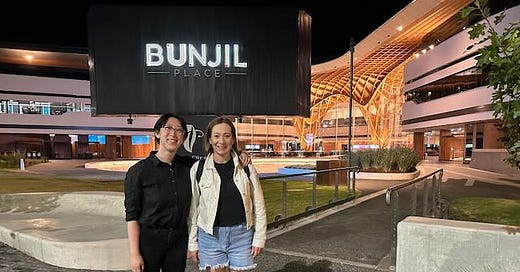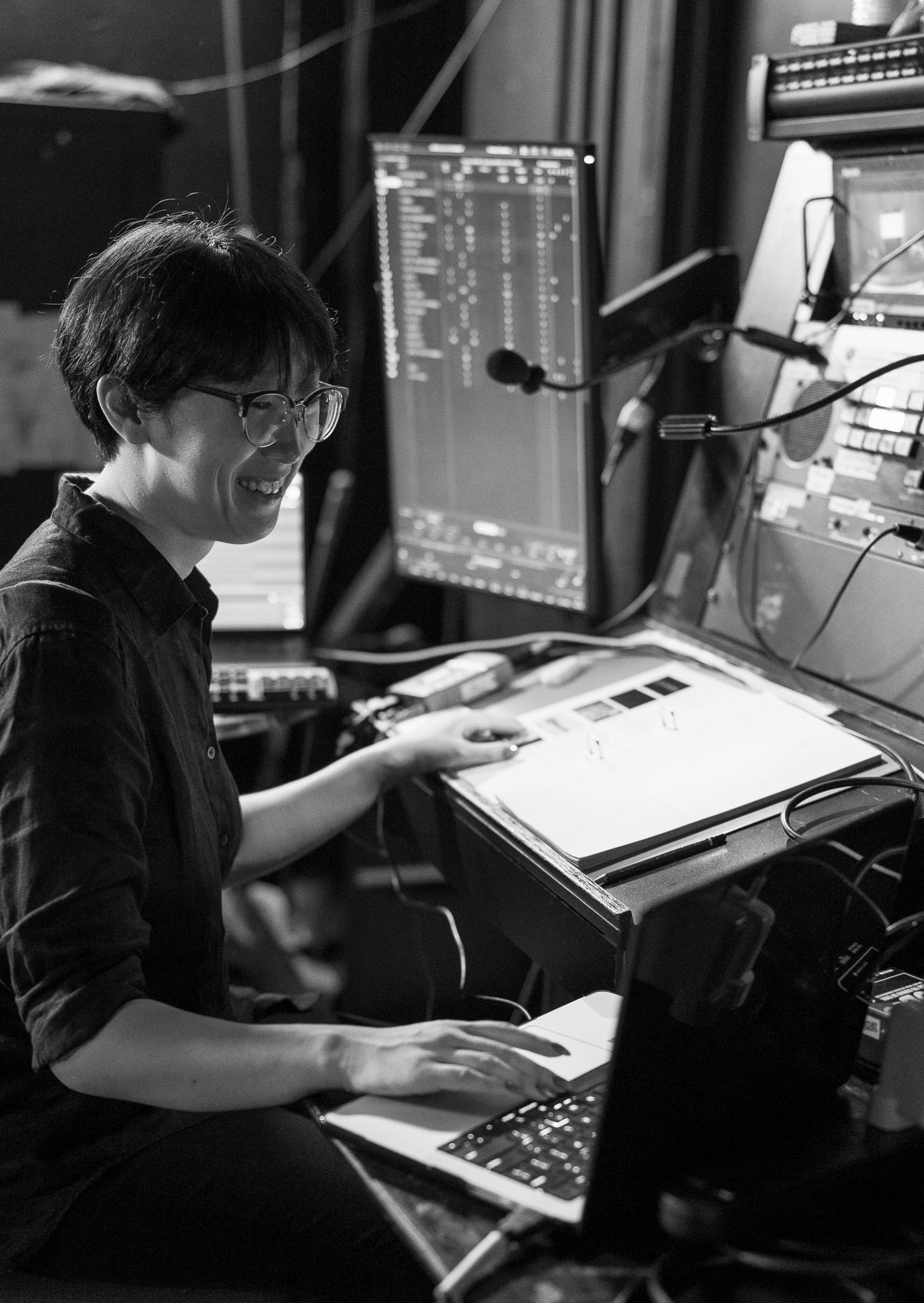Hip Replacements In Gap Year: a Q&A
My friend Jen said she has the bones of an older person. I asked her what she meant by that.
Hello friends,
I recently heard a talk on ageing where the researcher said we “age heterogeneously”, meaning each of us has a different experience of ageing. This got me thinking about an impressive and lovely woman I worked with this year during the Australian tour of Lost in Shanghai. Her name is Jen Jackson and she’s a stage manager for theatre.
Stage management is about juggling lots of different balls. It’s a fabulous world involving all varieties of humans and the methodical transformation of a performance venue. The job of stage manager is often physically taxing and the hours are long. Some of the older theatres have a lot of stairs and mysterious corridors! I discovered during rehearsals that our stage manager, Jen, sometimes used a cane when she walked. It turned out that she was often in a lot of pain. As we travelled across the country I learned that Jen had a unique perspective on ageing as a result of a rare disorder. She is twenty-nine.
Jen: When I first started walking, I had a strange gait. I was very pigeon-toed and my legs are different lengths. I had a lot of pain at night. Mum tried to take me to different family doctors and specialists to see if they could find out what was going on. But for years the medical profession told her there was nothing wrong with me. The doctors wouldn't listen to her, telling her she was a neurotic mother who just wanted her kid to win a race. She was dismissed for such a long time.
It wasn't until I was about ten years old that there was a lucky coincidence; our family doctor retired. I went for a checkup with a new doctor and as soon as I walked into the room, he said “Why is she walking like that?” And that's where it all started.
What were you diagnosed with?
Jen: The underlying condition is a connective tissue disorder called Multiple Epiphyseal Dysplasia. It affects your growth and your bones. I also have osteoporosis and arthritis. I share a lot of symptoms with something called Ehlers-Danlos Syndrome where I have hyper-mobility in my joints [As a demonstration, Jen bends her fingers back further than mine would go, making me squeal]
Jen, what was it like doing sport at school?
Jen: I was never a sporty child. I always lost races. And I was very afraid of balls coming towards me. I grew up in the Blue Mountains outside Sydney and spent a lot of my childhood going to the children’s hospital. I got treatment for bone density every three months. I’d be in hospital and get an intravenous drip for a couple of hours. And there were lots of scans and blood tests and things like that.
So what did you tell your friends about your condition?
Jen: I was in Year Five or Year Six at the time (ages nine to eleven). The doctors would say, “You have to limit your movement. You shouldn't do any high-impact sports and you have to be careful when you're playing because your bones are weaker”. And I remember saying to my friends at the time, that I couldn’t play some things anymore. It was hard for them to understand because it wasn’t like something suddenly happened to me. It was just the way my body was.
And what about the pain at that stage?
Jen: Sometimes it would be hard for me to sleep at night. I would tell Mum that my legs really hurt which was how she knew something was wrong. It was a bit unusual for a kid to be in that much pain. As I got older, the pain got worse because there was more wear and tear on my joints, especially in my hips.
So how did it progress through high school?
Jen: I used a mobility scooter when I was in high school because it was quite a big campus. And then I also started using a cane when I was in my final years at high school. At that point, I had very limited mobility and I couldn't walk by myself.
So my gap year after high school before I went to university was spent getting both my hips replaced. They were done separately. I got one done around March and then the other one was around October that year.
What difference did the hip replacements make?
Jen: Oh a huge, huge difference. It was a massive improvement in my quality of life. My condition affects my whole body. So all of my joints are affected and I still have quite a lot of pain. Right now, my knees are pretty bad. My ankles, my back and my neck have a lot of issues as well, but the hips were by far the worst. Getting those replacements at the age of eighteen gave me back a pretty extraordinary amount of mobility.
When you started university [note: after university Jen went to the prestigious drama school NIDA) to major in theatre studies, did you worry your condition was going to limit your dream of working in theatre?
Jen: I held back from some things things. I realised that I would need to manage everything carefully. So, I’d say, if I do this thing, that means I'm going to need a few days where I don't do anything because I'll need time to recover. But I still did most of the things I wanted to do and I still had a busy social life. I was very active and did the Student Theatre Society at the University of New South Wales. I actually did a lot of shows with them. Sometimes this just involved pushing through a lot of pain. It was very physical. Chronic fatigue comes with it and there’s a lot of brain fog as well. But I really wanted to do it.
Now that I’m working in the theatre world, I'm a freelancer so I still have to manage how I work. Sometimes I'll turn a job down because I can't do some things. I can't do heavy lifting and things like that.
So you’re twenty-nine. Do you think about the future, Jen?
Jen: I try not to think too hard about the future but in reality, since a pretty young age, I have always had this thing at the back of my mind. What's life going to be like, in like ten years or twenty years? When you are dealing with all of these medical issues, that’s how the doctors talk too. I have to manage things now, so that I'm in a better position in the future. So, I actually knew years before that I would get those hip surgeries in my gap year. It had been discussed. I’ve had a long time to adjust to all these thoughts.
What scares you the most?
Jen: I think the scariest thing is thinking about how bad it might get when I'm older. I always say, I have the joints and the body of an older person. And it's scary to think about that. If I'm in this much pain now, how bad is it going to be in twenty years time, and how am I gonna cope with that? And am I going to have even less mobility later? How restricted is my life going to be when I'm older? Because, in a way all my joints are already pretty old.
Have you met a lot of older people, Jen?
Jen: When I got my surgeries, I was put in a ward with older people who were having the same thing done to them! So we're all in a similar situation. It was strange being the youngest person there by a significant amount. As part of my treatment, I used to do hydrotherapy when I was in high school. And especially because I grew up in the mountains which already had an older population too. There were no young people doing hydrotherapy 99% of the time! I got a lot of comments from people, often assuming that I'd injured myself because I walked with a cane.
Jane: What sort of comments did you get from people?
Sometimes randomly, somebody will come up to me and say, “I'll pray for you” or “Do you want me to pray for you?” And I'm like, “No, thank you.” I'm not a religious person myself. I think these people probably mean well, and they're obviously just trying to express something, but I don't like the implication that there's something wrong with me or I deserve pity or something like that.
Then there's the classic situation of getting into an Uber and the Uber driver says “What happened to your leg?” and I would just say “I was born this way”. But yeah, you get a lot of comments of just people being surprised and people saying I’m very young to have had hip replacements. I just laugh it off, because I know people mean well. It’s surprising for most people that this can happen to a younger person but for me, that's just always been my life. It's a huge adjustment to realise that your body is no longer functioning in the way that it used to or the way you expect it to.







Aging is no picnic and having multiple medical challenges compounds the unlikeable bits. Thank you for sharing Jen’s journey with us. Courageous, uplifting, and inspiring are the words I think of.
Jen, you are such an inspiration. ☀️